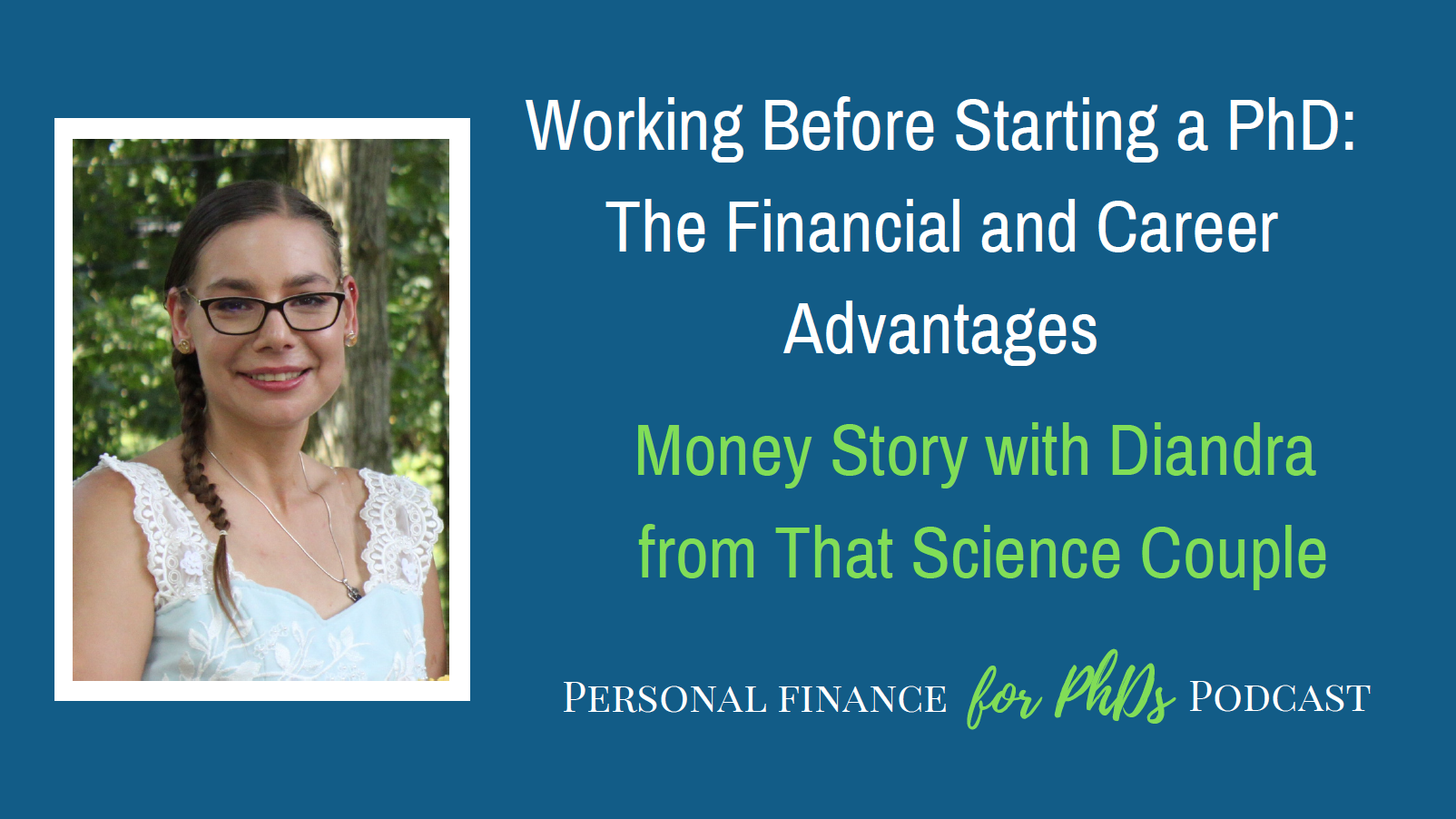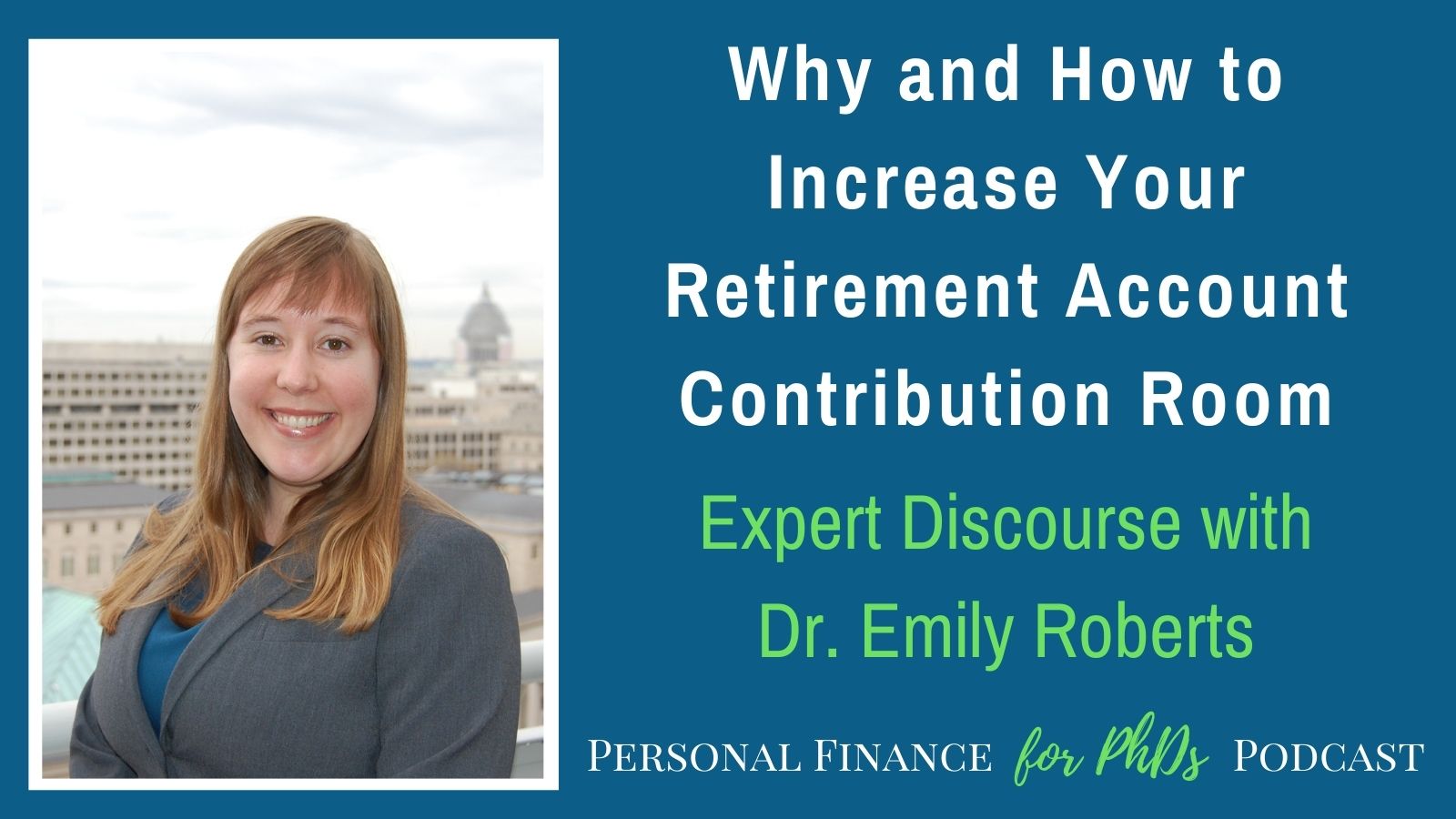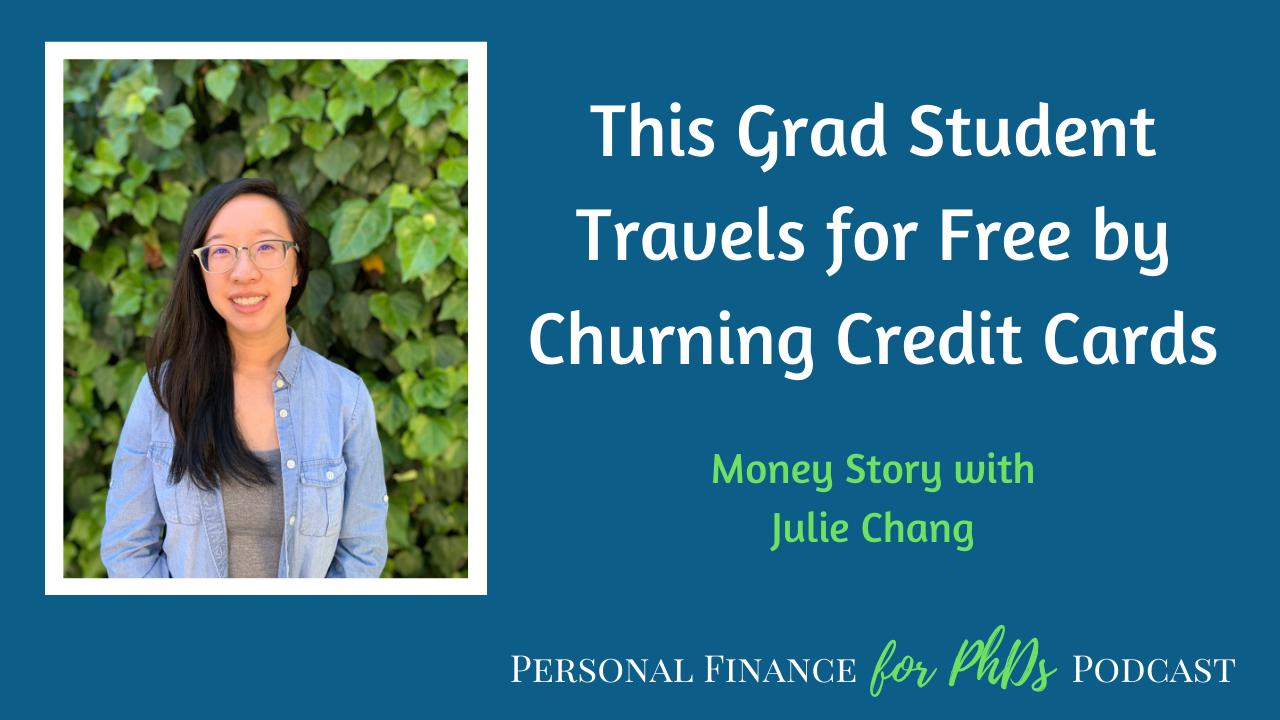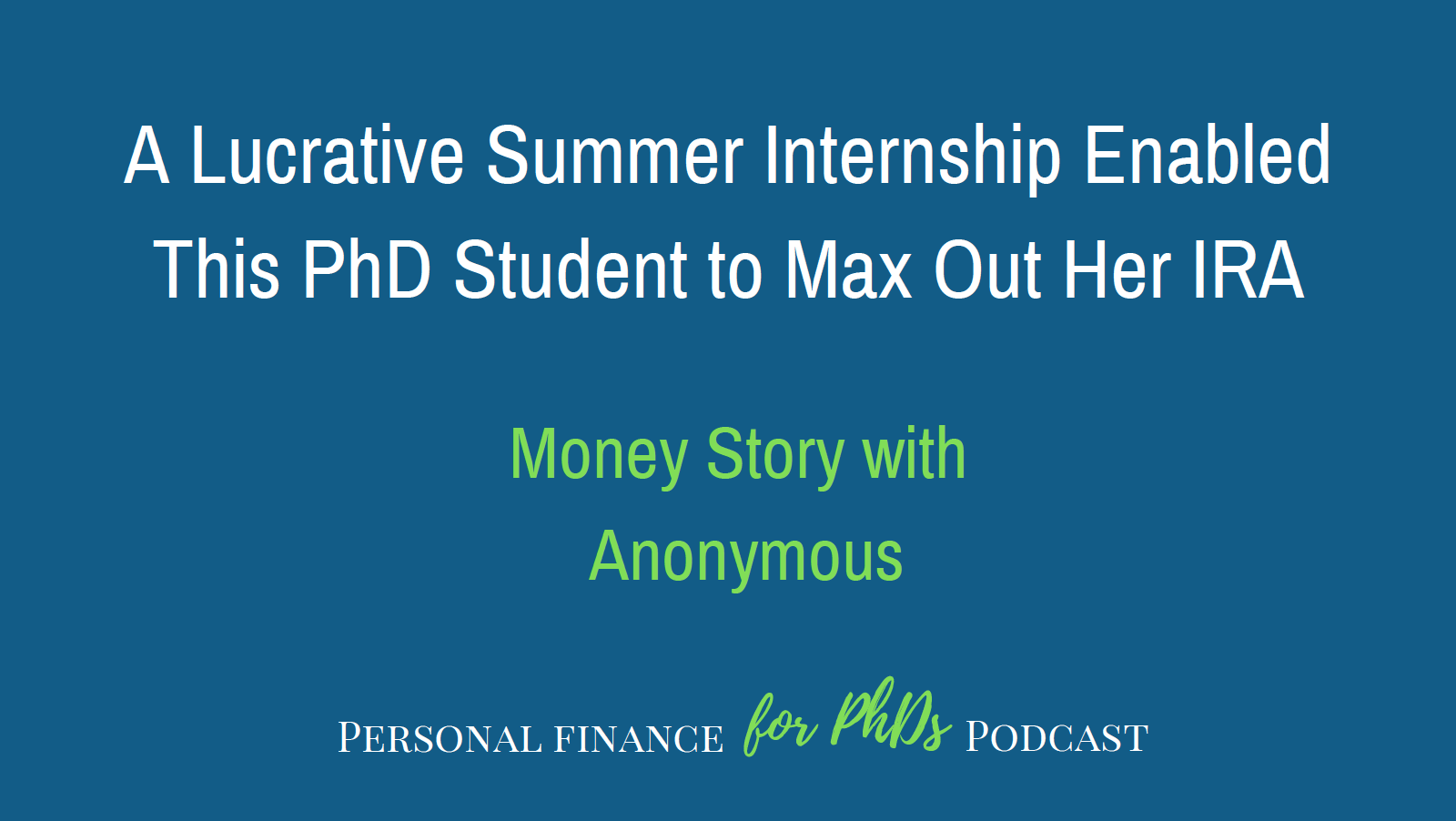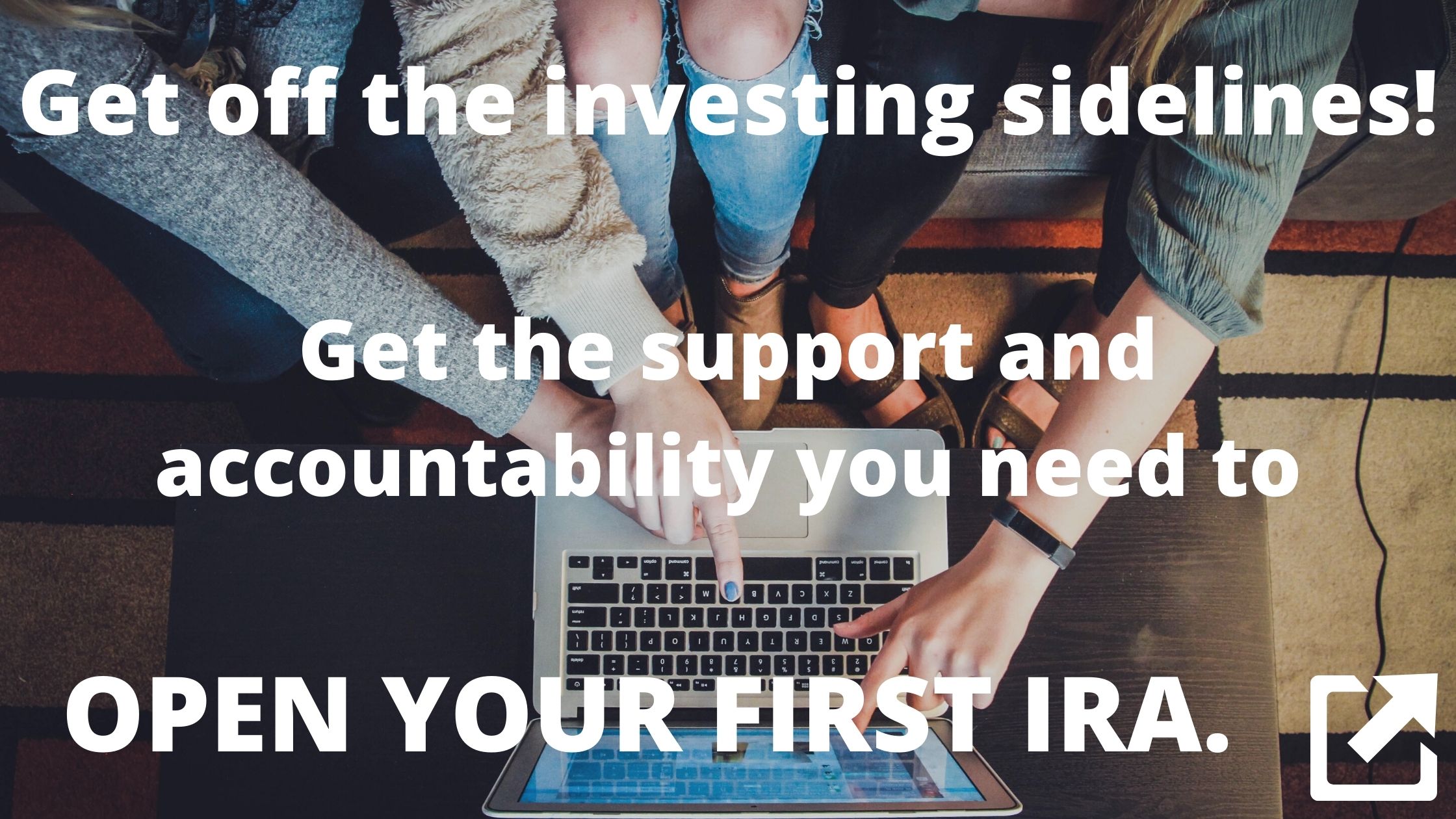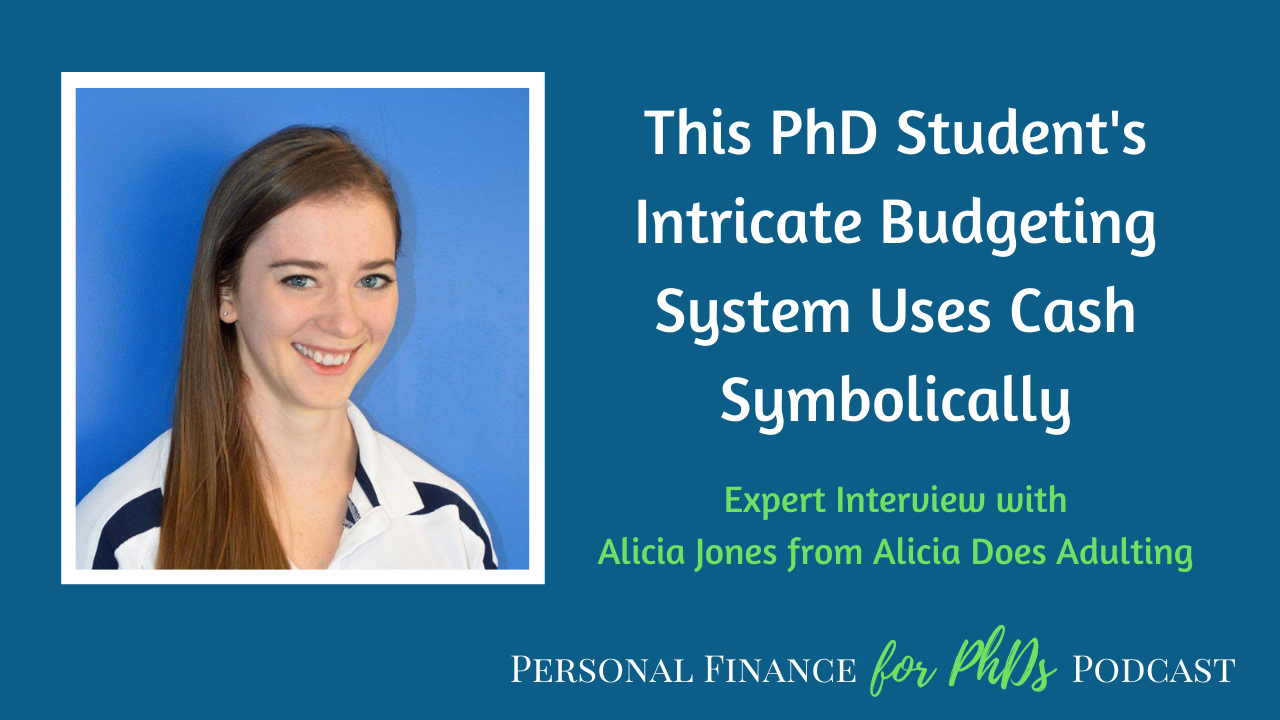In this episode, Emily interviews Dr. Chris Cornthwaite of Roostervane. Chris and Emily share the money mindsets that they have observed among PhDs and academics, including believing money and wealth to be evil, scarcity, relating time to income, and anchoring. They discuss how to identify and change your own money mindset. Chris shares how his money mindset has evolved from his youth idolizing poverty through his underpaid grad student years and now into his employment and entrepreneurial journey.
This is post contains affiliate links. Thank you for supporting PF for PhDs!
Link Mentioned in this Episode
- Find Dr. Chris Cornthwaite at Roostervane.com and on Twitter
- Get Money: Live the Life You Want, Not Just the Life You Can Afford by Kristin Wong
- The Millionaire Next Door: The Surprising Secrets of America’s Wealthy by Thomas Stanley and William Danko
- The Undercover Economist: Exposing Why the Rich Are Rich, the Poor Are Poor—and Why You Can Never Buy a Decent Used Car! by Tim Harford
- Millionaire Teacher: The Nine Rules of Wealthy You Should Have Learned in School by Andrew Hallam
- Rich Dad, Poor Dad: What the Rich Teach Their Kids About Money that the Poor and Middle Class Do Not! by Robert Kiyosaki
- The Millionaire Fastlane: Crack the Code to Wealth and Live Rich for a Lifetime! by MJ DeMarco
- Personal Finance for PhDs: Community
- Personal Finance for PhDs: Podcast Hub
- Personal Finance for PhDs: Subscribe to the mailing list
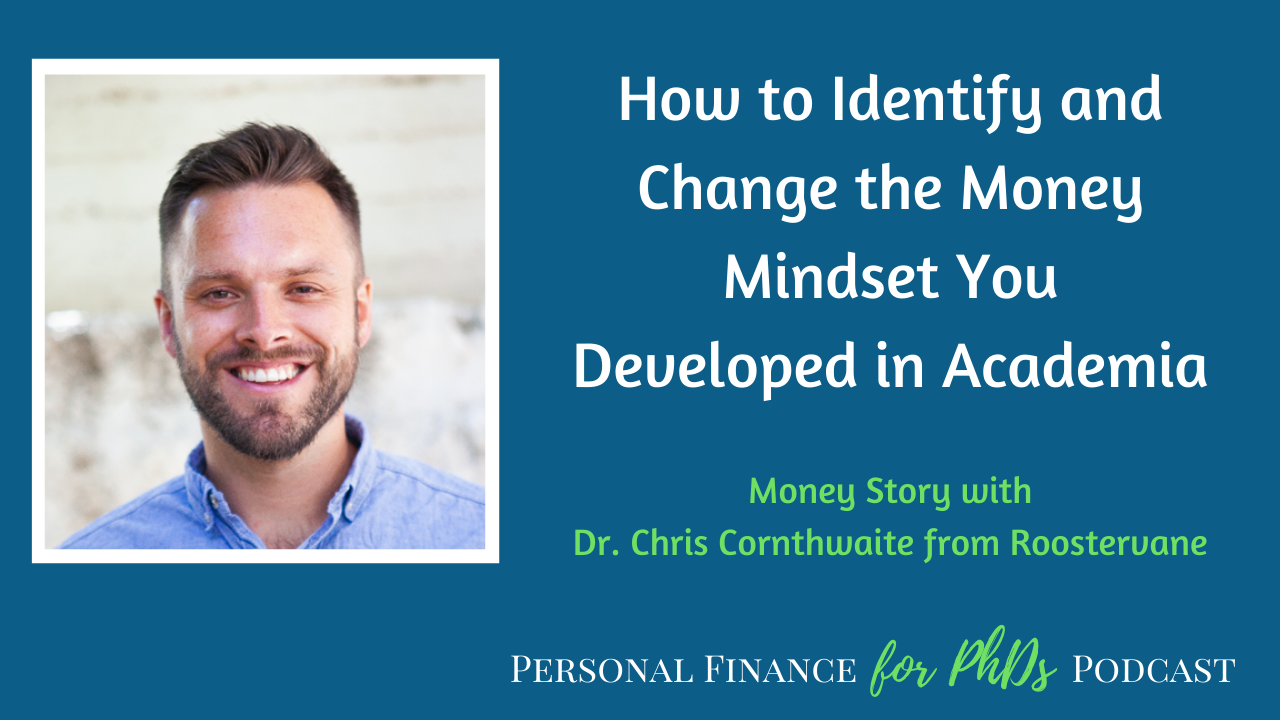
Teaser
00:00 Chris: It’s one thing to start when you’re, when you’re 20 or 25, and have the value of compound interest over time and save that $40 a month or whatever it was. But it’s actually quite a different thing to start when you’re 35 with student loans that need to be paid off and try to create a sizeable chunk of wealth.
Introduction
00:23 Emily: Welcome to the Personal Finance for PhDs podcast, a higher education in personal finance. I’m your host, Dr. Emily Roberts. This is season seven, episode 11, and today my guest is Dr. Chris Cornthwaite of Roostervane. Chris and I list the money mindsets that we have observed among PhDs and academics, including believing money and wealth to be evil, scarcity, relating time to income, and anchoring. We discuss how to identify and change your own money mindset. Chris shares how his money mindset has evolved from his youth idolizing poverty, through his underpaid grad student years, and now into his employment and entrepreneurial journey. As you’ll hear during this episode, one of the best ways you can change your money mindset is by intentionally seeking out and learning from people who have the money mindset you want to move toward, whether that is through books, other media or new acquaintances.
01:22 Emily: If this episode convinces you that you should work on your own money mindset, I invite you to join the Personal Finance for PhDs community at pfforphds.community. Inside the community, you can communicate with me and other like-minded PhDs through our forum and monthly live calls. The community has a monthly book club and group financial challenges as well. In November, 2020, we’re reading Get Money by Kristin Wong and in December, it we’ll read The Millionaire Next Door by Thomas Stanley and William Danko. Our challenges for November and December are to create a frugal stack and set up a system of targeted savings accounts. One of the eBooks included in the community, The Wealthy PhD, also has a chapter on what money mindset is, why it’s important, and how to shift it. While I didn’t understand it at the time being part of the personal finance blogosphere while I was in grad school was absolutely vital to the level of financial success I had then and now, and was directly my inspiration for starting my business. With the Personal Finance for PhD’s community, I’ve attempted to replicate many of the positive elements of that experience while making the whole process more time efficient and accessible for you. If you’re interested in learning more about and joining the community, you can do so at pfforphds.community. Without further ado, here’s my interview with Dr. Chris Cornthwaite from Roostervane.
Will You Please Introduce Yourself Further?
02:49 Emily: I’m so delighted to have joining me on the podcast today, Dr. Chris Cornthwaite of Roostervane. He writes a lot about PhDs and career transitions and career over there, but he also has a lot of material about money, wealth, money, mindset, and so forth. And that’s why I invited him on the podcast today to tell us more about money mindset. So, Chris, will you please just introduce yourself a little bit further to the audience?
03:14 Chris: Yeah, for sure. So in terms of my academic background, I have a PhD in religious studies from the University of Toronto and after I finished my PhD, I was kind of lost and didn’t know what to do for work. Kind of was the impetus for starting Roostervane, eventually. But I went and I worked for a think tank. So I ran projects for Canadian think tank. Kind of a lot of different projects, but some that kind of related to money that are still interesting to me is things like economic development and prosperity and things like that. And then I went and worked for the federal government for a little while, the Canadian federal government. I worked on a project that helps other countries launch refugee programs. Basically it’s a lot of like international diplomacy kind of stuff and that was really neat. And I still do some consulting in that world, in the refugee program world, but I also run Roostervane. I started a blog, initially it was kind of chronicling my own journey out of academia, but it’s just evolved to things that I like to write about. It’s become everything from a little bit on personal finance, as you say to careers, LinkedIn, ideas about purpose, which has really been an interesting question for me. That’s become about, I would say it’s maybe like 80% of the work I do, but it’s not my full-time income yet. It’s growing, but as you know, it takes time, so I’m working on that too. That’s me.
4:40 Emily: So interesting. Thank you so much. So money mindset is our topic for today.
What Are the Common Money Mindsets of PhDs and Academics?
And I wanted to start off by asking you what are the common money mindsets that you have observed in PhDs or academics?
4:53 Chris: This is such a fun conversation. I’m really glad to have it. I think the thing that I see a lot of, I mean, we could talk about scarcity mindset and that sort of thing, and that’s certainly common. I think the thing that I deal with the most, especially as people are like leaving academia and it’s not just about money, but it’s about careers in general, but there’s a lot of constructs within academia, like ideological constructs that money is bad, money is evil. The pursuit of money is something that, especially for those pursuing life in academia, a lot of people kind of buy the idea that this is a noble cause and worth doing for nothing basically. I think that a lot of PhDs have the idea that they shouldn’t think about money or that they’re bad for thinking about it or that they’re not serious academics if they want to think about it.
5:46 Chris: The irony is that, I remember having one exchange with a student in particular and he was kind of saying some of these things to me and he was quoting his professor. And some of the things his professor had said about how this is not about money. And I said, “is that your professor who makes $170,000 a year?” There’s a huge discrepancy, I think, between the idealism of PhDs and the reality of both the Academy and just “real world”. I think that’s the biggest holdup I see in terms of money mindset is that people have this idea that poverty is noble or that earning money is bad. Investing is capitalism, capitalism’s bad. I think those become really big holdups and I think can actually seriously hinder people from first of all, making good decisions about their career, but also from actually acquiring wealth and getting comfortable, much less wealthy.
6:38 Emily: So I think here, your discipline might be showing because like in contrast, so I’ve heard the same things, but it was not until I started speaking with PhDs more widely across a lot of disciplines that I encountered that mindset. Because for me as an engineering PhD and in the STEM fields, yes, scarcity mindset was there. Yes, undervaluing yourself was there, but not the money is evil aspect of things because I think we were all expecting like, okay, yeah, this is a low-income period of life, but this is not characterized my life overall. Like overall I’m going to be a highly employable, decent to good earner as an engineering PhD or STEM PhD. And honestly, even in my let’s say path through academia in terms of the professors that I interacted with, because I was in science fields and engineering fields, I didn’t have any professors say to me, capitalism is evil or anything like that. So it’s not an idea that I found until I started interacting with humanities PhDs that I even encountered that. I think this is really feel dependent.
7:48 Chris: A hundred percent, I agree. And it’s interesting for careers too. I’m always kind of realizing where these field differences are and it’s hard because I write for PhDs, like it’s one audience, and in some cases I think there are a lot of things that are kind of universal, but you’re a hundred percent right. And I think a lot of the kinds of ideologies around money that I was exposed to, and I mean, I still see them a lot, but you’re you’re right, they’re definitely much more predominant in humanities, social science fields for sure.
8:13 Emily: Yeah, but I’m so glad you brought that one up because I think that one is maybe the most insidious, like the hardest to reverse, which of course we’ll get to in a moment, but that was a great first observation to bring up. Do you have any other ones? You mentioned scarcity mindset earlier, but didn’t actually define it. Do you want to talk a little bit more about what scarcity mindset is?
8:31 Chris: Gosh, yeah. I think scarcity mindset for me, the way I understand it is just the idea that like there’s never enough money and it’s always, I’m just going to be poor and I’m always going to be poor. I mean, I don’t know, we’ve never had the conversation about the philosophies of money behind it, but a lot of the people that I read see this as manifesting into your life, that you adopt this type of scarcity and it becomes true for you. There’s a whole different conversation we could have, but I think at least anecdotally that’s been true in my life too, that when I kind of live this kind of scarcity — there’s never enough money, I have to keep it all tight, and pinch every penny and be just really, really controlling about, about my money. I think that’s what I see and I saw a lot of that in academia and I think, I mean, a lot of people are poor. I actually did all right, because I won the right fellowships. I mean, it’s just luck of the draw. There’s not really any reason why one PhD makes $15,000, another one makes $50,000. But all that to say that I saw a lot of that scarcity mindset. But the other thing that I think one of the things that I really observed academia taught me was this idea of linking your time to money. I didn’t get paid by the hour other than when I did TA or RA work, so I think one of the really valuable lessons I learned in academia and it’s a mindset that academics have if you kind of dig for it is this idea that you can actually work on a grant application for five or six hours and it might bring you a hundred thousand dollars. I think there are also some positive money mindsets from academia too, if you want to dig for them, but it’s just hard to kind of hard to get at them sometimes.
10:16 Emily: Yeah. I think that’s a really interesting point to bring up. Actually, I wanted to go back to the scarcity mindset for a second because there’s actual scarcity in your life and there’s the scarcity mindset and those things can come together or they can be separate from each other. You can have one or the other, you can have both, you can have neither. There is actual scarcity, especially at the graduate student level in terms of how much money you’re making. Now, does that apply to everybody? No, because of course there’s fellowships you can win, you can have side hustles, but there is scarcity in a sense. But whether it limits your mindset or not doesn’t necessarily come along with that scarcity. And the other thing is the academic job market, like there is literal a lot of scarcity in the academic job market. And I think that PhD’s observing that market, even if they choose not to pursue it or don’t end up in academia long-term, they still take that observation with them onto their other career paths and imagine the kind of scarcity and other places that they have rightly observed within academia.
11:15 Chris: Yeah. That’s really interesting. One thing I’m thinking of as you say that some of my professor friends who sat on on grant committees, especially for university-level scholarships and realize how many scholarships actually didn’t get any applications. So it also kind of does make me think that like there is of course literal scarcity, but I think one of the ways for example, that that can play out is that instead of me saying as a student, how can I go make more money or how can I increase my, my income? What scholarships can I apply for in this case because there was a lot of years that they didn’t give out a lot of the scholarships. It’s easier just to say, well, I’m just poor and this is my lot in life and woe is me kind of thing. So I hear what you’re saying. I do. I totally agree with you. And I think there’s a balance there for me between the actual scarcity and the mindset that says, how can I make the most of this? There’s obviously going to be some kind of a limit, but how can I expand what I do have access to?
12:11 Emily: Yeah, exactly. I think it’s really depressing for graduate students to think about their hourly wage, because they imagine, especially because they work so many hours, usually beyond 40 and yet they’re only being paid ostensibly — you mentioned RA or TA work earlier, that’s typically limited to like 20 hours a week, at least in the US — so they’re calculating this off of like 40 plus hours per week when actually they’re only being paid for 20 and technically they’re doing their dissertation for free and a lot of people don’t understand that. So it is depressing, they calculate their hourly wage, but like you said, that’s not actually literally what they’re being paid for. And sometimes you can, as you said, win an award for just a handful of hours of extra work on top of the work that you are already doing. So I do like the idea of divorcing the hourly wage thing, but it’s disheartening to think about in the first place.
13:05 Chris: I’m trying to look on the bright side. There’s a lot to be sad about, about the financial state of academia. So overall I’m not saying it’s like, great, but there are things that I’ve realized — I know we’re going to talk about it later — but as I’ve moved into my life, there are things that academia trained me for that I’m actually like, Oh, that’s actually not a bad thing.
13:22 Emily: Yeah. So let’s finish up talking about the mindsets that you see. Are there any ones that you’ve have any other ones that you’ve observed either positive or negative, helpful or unhelpful?
13:32 Chris: Let me think. Well, I guess so, so I think the thing that initiated this conversation was you had mentioned a post that I wrote where I had identified a lot of different things that I had learned. I’m trying to think about how much they relate to mindset, but I think there are principles, some of which do relate to mindset, about money that students kind of carry forward. So we already talked about the hourly wage, but I was thinking about in terms of scale, like when you think of I don’t know, a journal publication, like creating one thing that can influence multiple people. That’s not so much a mindset though. I guess I think the answer is no, I don’t really have any other mindsets offhand that I talk about.
14:13 Emily: I think the only other one that I’ll bring up is anchoring. So when you’re in graduate school and you’re making this tiny hourly wage or maybe you think about your yearly salary also tiny, because you’re anchored there, because that’s the first, early on salary that you’ve experienced in your life, you may not really understand your value in the marketplace once you go forward from that position, whether it’s in academia or outside of academia. And so your anchored to this, as you mentioned, 15 or 30 or whatever it is, thousand dollars per year, you’re making as a graduate student and you think, “Oh, wow, could I make double that?” And that’s like amazing to you. Instead of thinking, I want to three X, four X, five X, 10 X what I was making in graduate school, or more. I think that’s another really insidious one is, is the ultimate under valuing that you do later on.
15:04 Chris: Yeah, that’s a great point.
How Do You Identify Your Money Mindset?
15:06 Emily: So we talked about the money mindsets that are common among PhDs. These are not universal. So how does an individual determine what are the money mindsets that I currently have? And this is such a tough question because money mindsets are so closely held you don’t even recognize them as such. It’s just how the world works according to you. So how do you identify your own, your own money mindset?
15:28 Chris: I think the thing that helped me most was reading. I would say the first book I read on money was The Undercover Economist. And I read that, I mean, that must be 10 years ago now. I read it somewhere in my graduate journey, I think pretty early on and it rocked my world and I started reading every single personal finance or money book I could get my hands on after that. So I’ve read a lot of them. And I think a lot of what I saw through reading kind of reflected back to me in my own life.
16:01 Chris: For example, I started to, I can’t even pinpoint like where I got it from, but I started to see like things that I was raised with. I was raised in quite a poor family. My dad worked as a maintenance man in hospital, my mom stayed home with five kids, and a lot of my money mindset came from there. There was never enough money, money doesn’t grow on trees, money is for other people, and then we were also religious, so it was also spiritualized. I don’t know if I ever heard that money is evil, but I definitely heard that poverty was kind of noble, poverty was spiritual. I think the more I started to read and just hear people name similar things to what I had felt and seeing other people who grew up in similar places, I started to unpack a lot of those. There’s one podcast I really liked, it’s called Profit Boss, and she really did a fantastic job. Is it Hillary Hendershot? Do you know that one? I haven’t listened to it about five years.
17:00 Emily: I don’t think I know that one.
17:00 Chris: She had done an episode on money mindset, and it was really good and really opened up to me a lot of my own limitations and that really helped a lot. I think just hearing people name their money mindset and seeing it in myself.
17:17 Emily: So I totally agree with you that you have to start encountering other minds to recognize your own mindsets and whether that’s through reading as you were doing. I also early on in my life journey was reading the personal finance blogosphere quite a lot. So hearing from other personal stories of people who are talking explicitly about money. That’s the thing is you have to actually kind of get towards money or money related topics when you know, exchange these other minds. So it’s a little bit easier to do in an impersonal format, like reading or listening to podcasts or watching videos or whatever. But I’ll add into that talking with other graduate students, maybe like we mentioned earlier, outside your own discipline and outside your own worldview. Or not even other graduate students, but just like your peers, maybe peers who have real jobs, that can help you open up. If you’re actually, again, touching on these money or money related topics can help you recognize what’s a mindset in you and what’s like actual observable truth about the world versus just your perception of it. Encountering other people I think is crucial to identifying your own money mindset.
18:24 Chris: The kind of thing that that makes me think of is this idea of even talking about money. And I know that’s another money mindset I had is like, we don’t talk about money. We don’t talk about it with anybody. Money, politics, and I guess religion were the three things you’re not supposed to talk about. Right. And that’s definitely something that I’ve experienced. It’s funny, even with Roostervane. For example, I wrote a post a while back and it was just for fun about how PhDs can be worth a $100K or something, and it was one of the most read posts that I’ve ever done, but it’s actually one of the least shared. People were happy to kind of read about it, but didn’t really want to talk about it. I think there’s a lot of shame in talking about money and expressing an interest in money, and even an interest in having money or growing wealth. That’s another mindset that had held me back in the past. And I think it’s still pretty prevalent.
Commercial
Emily here for a brief interlude. If you are a fan of this podcast, I invite you to check out the Personal Finance for PhDs Community at pfforphds.community. The community is for PhDs and people pursuing PhDs who want to take charge of their personal finances by opening and funding an IRA, starting to budget, aggressively paying off debt, financially navigating a life or career transition, maximizing the income from a side hustle, preparing an accurate tax return, and much more. Inside the community, you’ll have access to a library of financial education products, which I add to every month. There is also a discussion forum, monthly live calls with me, book club and progress journaling for financial goals. Basically, the community exists to help you reach your financial goals, whatever they are go to pfforphds.community to find out more. I can’t wait to help propel you to financial success. Now back to the interview.
How Do You Change Your Money Mindset?
20:27 Emily: Okay, so an individual has started to identify their own money mindset by listening to this podcast or reading your articles or reading other materials. How do you think they should actually go about changing a money mindset that they’ve identified as unhelpful that they have?
20:44 Chris: I’ve given a lot of thought this. It’s an interesting question, because I think what I realized is it doesn’t change overnight and I will find myself even years later, like something identified years ago and all of a sudden I kind of will stop myself when I’m doing something and say like, Oh, that’s my X mindset that has kind of played in, but it’s kind of sneaking back in. It’s really, really hard to change the way that you are kind of hardwired to think about money. It takes a lot of time. I mean, I’ve done things like I do journaling and I will sort of journal about it. I just watch and read a lot of stuff. I think really immersing yourself in things that kind of present a different view from what you’re used to, I think that kind of immersion has really helped me a lot. I’m trying to think what else. Those would be the two main ones, just kind of exposing yourself to different ideas and kind of recognize that you’re on a journey to change your money mindset. It will definitely take time. It’s not going to happen overnight. Start taking kind of the little incremental steps to grow it. And I think also education, I would say, is a big part of that. The more you learn about money, the more you learn about growing wealth, the less scary it get. It can get confusing because there’s a lot of contradictory information, but it’s at least less scary. So ideally you’re going to, you’re going to be a little more competent and therefore comfortable with actually thinking about and dealing with your money.
22:07 Emily: I totally agree with you that I think the first stop is sort of the extension of the identification. It’s continuing to encounter other ideas about money and maybe now you can kind of selectively go towards, “okay, well, this is a money mindset that I would like to cultivate, or this is the money mindset I want to get away from, so I’m going to specifically listen to source X or source Y, which is going to help me move again slowly over time towards that more helpful money mindset.” So yeah, I totally agree. Like for instance, listen to this podcast. Maybe this is giving you a different perspective on money than you had before. Or continue to read other sources. I know I, as I mentioned earlier, totally immersed myself in like the personal finance blogosphere. That was really helpful in changing some of my money mindsets, especially around like earning more because definitely as a graduate student, I had those limiting beliefs about like, I can’t have a side hustle and like, I can never increase my stipend, but that turned out to not be true after working on it for years and years I finally figured that out. So definitely getting around other people. I don’t remember the exact phrase, but there’s that thing where like, you’re the average of the five people you spend the most time with. And so with respect to your money mindset, if you’ve had parent one, parent two, professor one in that circle before, you can maybe, at least with respect to this subject, edge those people out in favor of people who, have the mindset that you want to adopt.
23:28 Chris: Exactly. Yeah, I totally agree.
23:30 Emily: And I’ll add in, you mentioned a little bit earlier, abundance mindset and thinking and so forth. And I’ve also read a little bit about that in the entrepreneurial space. That’s how I actually first sort of encountered the topic of mindset was through the entrepreneurial stuff. One of the things that is talked about a lot in that space, which I think might be helpful, is actually writing and saying affirmations. And you mentioned, it’s a little bit related to journaling. Basically what we’re talking about is self-talk. You’ve been telling yourself money is the root of all evil and capitalism needs to die and I will never have money and all those things. You’ve been telling yourself those things for years. And so now you need to start telling yourself other things. It might be helpful to actually write down an affirmation, something that you know maybe intellectually to be true, but you don’t really feel it. You haven’t really internalized it yet and start reciting those to yourself. Maybe it’s once a day or a few times a day, to kind of get that self-talk like grooved in. And so eventually you’ll go to it more naturally. This is something I recommend to people who I work with on money mindset. It’s not something I practice all the time, but I do it from time to time when I feel like I need a little boost or a refresher with my mindset. Have you ever done the affirmation thing?
24:46 Chris: I do actually. I think I just, wasn’t clear in defining how I think of journaling because I do journaling, but within my journaling, I do affirmations as well. I have every day and there’s one in particular, there’s one that I’ll share just because it’s been a recent realization for me. I’m not particularly religious anymore, but coming from this idea of my youth that having money is evil somehow or whatever, I’ve really been thinking through like trying to get myself to adopt the idea lately that money is almost spiritual. That having money and creating wealth, especially as an entrepreneur, is actually an indication of the value that I bring to somebody else’s life. Rather than our ideas about entrepreneurship growing up is like, well, business people trick people into giving them money or whatever. In fact it’s quite the opposite. My wealth, the amount that I get paid is reflective of the value that I bring to people’s lives, and that’s really a beautiful thing. I think that’s one thing, just for example, that I’ve been kind of writing down variations of that for quite a long time now, trying to really worm it into my head because I really do believe it’s true, actually.
25:54 Emily: Yeah. I’m working on a similar one for me and my business as well. The amount of money you’re bringing in reflects the value that you bring to the world. That’s true, if you have a job too, but it’s sort of brutally true when you’re an entrepreneur, like you’re feeling that like all the time, there’s no comfort of the salary.
Chris’s Own Money Mindset Journey
26:13 Emily: Okay, so we’ve talked through what kind of mindsets you might have if you’re in academia, how do identify them, how to change them or start to change them, because you said, it’s going to be a process. You’ve talked about your own personal story here and there throughout this. Is there anything that you want to add more so about your career or your financial journey, especially as it relates to your money mindset?
26:35 Chris: Yeah, I think it’s interesting. I’ve had a constant evolution of my money mindset and it started back when I started reading personal finance books, at the beginning and each personal finance books was like a revelation. Like the first one, I remember reading a book called The Millionaire Teacher. I don’t know if you know that one. And it was like, okay, it’s low cost index funds, that’s how I’m going to build wealth. Low-cost index funds, low MER, ETFs — that’s the answer. And then I read the next one and it was like, actually people with managed portfolios do better over time and like, okay, who do I believe?
27:11 Chris: I think one of the most interesting things about my money journey has been, first of all, just digesting the huge amount of contradictory information out there. And there is a lot of it. For example, I remember reading Dave Ramsey and David Bach around the same time, and Dave Ramsey is like, pay down debt, don’t buy a house until you’re out of debt and David Bach was like buy a house tomorrow because nobody’s going to let you leverage that amount of money anywhere else. So it’s funny, I think like looking back now, I was forming my own views around money, even though there are little nuances in how they actually play out. I remember reading one book in particular and it was after I had read all these different people and the book was, I’m almost ashamed to say it. There are two money books I’m really ashamed to say that I like. I wonder if you could guess them, the first is Robert Kiyosaki’s Rich Dad, Poor Dad.
28:05 Emily: Yeah I was going to say Rich Dad, Poor Dad.
28:08 Chris: I’m so embarrassed to say that I liked that one. First of all, because if you Google Robert Kiyosaki, as an individual, I’m not endorsing Robert Kiyosaki. He’s had some interesting business practices and definitely has some interesting beliefs today. But the book was revolutionary for me. It really changed the way that I thought about business and wealth and just my own upbringing. The second one, this one it’s called The Millionaire Fastlane: Crack the Code to Wealth and Live Rich for a Lifetime! It’s by a guy named MJ DeMarco. I would almost recommend it, but I’m hesitant because it’s like a bro book. He’s just one of those…he was an internet millionaire and it’s really, especially when you read it there are just some things that like don’t sit right. But the one thing that I will say that hit me about that book is he said actually when you look at all these personal finance gurus, none of them got rich off of following their own advice. Dave Ramsey and Susie Orman, these people didn’t get rich from saving 15% of their paycheck. They got rich by creating something that had massive value, massive scale, and creating huge personal brands and putting it out there in the world.
29:16 Chris: And I think that was really like something clicked. I had been working for the government too and realizing that even though I was making quite good money compared to what I was making in my PhD and I was interviewing for jobs that would make even more, I was giving away a third of it in taxes. I was struggling. Even our family, we thought we were going to be wealthy now that we have a paycheck and have a good job and I have a pension. And I mean, the opposite was true. Trying to scrape together that 15% to save every month or whatever it was going to be, it felt almost impossible, just because of the realities of our cost of living and raising kids and unexpected expenses. And I remember kind of thinking this through and saying, okay, it’s one thing to start when you’re 20 or 25, and have the value of compound interest over time and save that $40 a month or whatever it was. But it’s actually quite a different thing to start when you’re 35 with student loans that need to be paid off and try to create a sizable chunk of wealth. It’s possible. It’s definitely possible.
30:23 Chris: At the time I was the only one working my spouse Carolyn was home with our kids and she is a graphic designer, so she does some freelance work, but she wasn’t making a full-time income. So I think I just kind of came to the reality and it was about the time I read this, that it kind of shook me. And I said like, actually the way that I’m thinking about wealth is right for a lot of people, but it might not be right for me. For your listeners, there’s probably a variety of people. If you’re a two income family earning $180,000 a year, it might be pretty easy to catch up and squirrel away 30% a month instead of 15% a month and catch up to where you would have been. But for my own reality, I fell in love with the idea of business and the idea that in my case, especially with an internet business that I could start with almost like nothing. I could start with $3 a month and create a business that’s worth a lot of money. I didn’t know where else you could leverage that. Like you have that kind of leverage or create that kind of scale from starting with like paying Bluehost $3 a month and putting my ideas online to creating something. And I don’t know exactly, like I’m not great at evaluating blogs, but I think even today, Roostervane, from what I understand would be worth like between $30 and $60,000, which is not a huge amount of money, but I started it last year.
31:39 Chris: As a business person, it’s just thinking through business has changed everything about how I see money and I’m no longer one of those people trying to squirrel away part of my paycheck. And those are totally fine if that’s the position somebody is in and that’s kind of their money worldview, that’s totally great. But for me personally, I just got a lot more interested in creating an asset. Creating this asset that’s called a business and it changes everything. I don’t really care how much I take out of the business. I don’t care how much my paycheck is because I actually love having money in the business to reinvest back into it. It’s just little things like that, that as an entrepreneur radically reorients your relationship to money and it really changes the way you view everything. It’s been a long journey and I think I’ve talked a lot about it, but it’s been really interesting, and I still have so much to learn, but it’s just that constant growth and realization, coming to the idea that there are some principles that I’ve come believe about money, about things like scale and impacting people and creating value. And that’s some of the things that I’ve put on the blog, which I haven’t really blogged about why you should invest in low cost index funds. I’ve just blogged about here are some of the kind of generic things that I believe about building wealth.
32:54 Emily: Yeah, I’m so glad to hear that narrative and I see a lot of my own story reflected in that as well. Of course, I’ve also come to entrepreneurship.
Chris’s Business
33:01 Emily: So if people want to read more stuff from you, tell us where they can, they can find you.
33:08 Chris: Yeah, Roostervane.com. It’s kind of like a weather vane, but there’s a rooster on top — Roostervane. And that’s where I blog about…my main thing is careers with purpose. It’s just thinking through like how we actually get jobs and careers, but also how we make meaning from them. That’s the kind of humanities thing that I bring to it is how we think about meaning. So Roostervane.com. You can find me on Twitter, @cjcornthwaite is my handle. You can just search my name, Chris Cornthwaite. Twitter, LinkedIn, wherever I’m always happy to chat.
33:40 Emily: Wonderful. And last question for the interview, Chris, what is your best financial advice for another early career PhD? And it could be related to something we’ve already discussed in this interview, or it could be something completely else.
33:52 Chris: Educate. Education, learn. It’s amazing how many people can spend five or ten years learning about the nuances of a field, but don’t actually want to take any time to learn about the basics of personal finance. I would say read as much as you can, listen to a podcast like this one, and just educate yourself and you’ll be empowered to actually create wealth and to get over some of those mindsets we’ve talked about.
34:18 Emily: Wonderful advice. Thank you so much for joining me for this interview, Chris.
34:22 Chris: Thank you, Emily. My pleasure.
Outtro
34:24 Emily: Listeners, thank you for joining me for this episode. PFforPhDs.com/podcast is the hub for the personal finance for PhDs podcast. There you can find links to all the episode show notes, and a form to volunteer to be interviewed. I’d love for you to check it out and get more involved. If you’ve been enjoying the podcast, please consider joining my mailing list for my behind the scenes commentary about each episode. Register at PFforPhDs.com/subscribe. See you in the next episode, and remember, you don’t have to have a PhD to succeed with personal finance, but it helps. The music is stages of awakening by Poddington Bear from the Free Music Archive and is shared under CC by NC. Podcast editing and show notes creation by Lourdes Bobbio.
